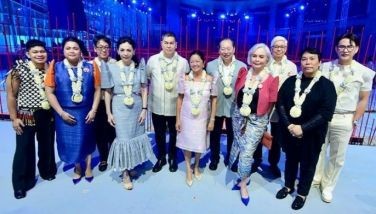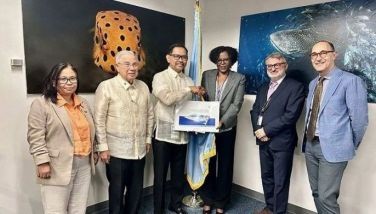Fil-Hawaiians give PCs to Cebu school
January 13, 2006 | 12:00am
CEBU CITY — The computers may be old and used, but that doesn’t matter to students at Arcelo Memorial High School in Lilo-an, a rural community near this city.
The donation from Hawaiian Electric Co. of computers discarded after a hardware upgrade helped give these students their first access to the Internet and high technology.
The computers were shipped to the Philippines by Hawaii cardiologist Dr. Daniel Cañete, who started a foundation named after his mother, a public school teacher in Lilo-an for 29 years before the family immigrated to the United States.
When his mother died, Cañete started the Ambrosio Soledad Cañete Foundation with a small inheritance.
The computers were donated to a local elementary school seven years ago, but since then Cañete has shifted the foundation’s focus to Arcelo Memorial High School.
About 70 percent of the students at Arcelo will skip college and go straight to earning a living at a job or on the farm, said senior teacher Hipolito Pesarido Jr.
"The majority (of families) cannot afford to send their children to college," Pesarido said. Even if they do pass the scholarship examinations, without access to computers in high school, "they will be behind those who are computer literate," he said.
A main focus of the foundation is to try and level the playing field for public school students, said Christopher Roble, Canete’s nephew who also helps administer the foundation.
"We give them a chance to compete with other students," Roble said.
Lovebel Talisic, 15, and Janice Paras, 16, are two of the top students at Arcelo Memorial High School. Paras started working on computers only last year, but she won a province-wide financial preparation contest using Microsoft Excel, beating out private school students who have been working with computers since grade school.
Talisic started on computers in elementary school through the Canete foundation. She is now designing a website for the school.
"I really like computers," Talisic said. "Maybe I was born to be a computer addict."
Both girls have older siblings attending college now, which could be a factor in whether they are able to go to college immediately after they graduate.
Because of the cost, even with a scholarship, they may have to wait until after their older siblings graduate before they can go to school.
Talisic is determined to continue in school after graduation and has started working part-time to pay for some of her own expenses.
"I will go to college," she said. "I will not wait."
In a school where textbooks are scarce, the computers offer a chance for students to do research online.
Genman Goo-Ong and Shiera Mae Butar are working on a project to explain the visual phenomenon known as "dancing sun."
"When you look at the sun, it sometimes appears like it is dancing," Goo-Ong explained. "The sun is dancing because of the particles in the atmosphere."
Without the Internet, research is limited, said Ronald Ababat. "We don’t always have the topics we need on campus."
Some of the encyclopedias at Arcelo date back to 1961.
Maryknoll High School in Honolulu has a sister-school relationship with Arcelo Memorial High School. Maryknoll has donated old textbooks and pocket books to practice reading English.
Computers have made it possible for the two schools to exchange e-mails and for students to talk to each other through web cameras.
But the program is on hold for a while, because the Internet is down on campus. The Canete Foundation is hoping to install a broadband connection soon, Roble said.
High-speed Internet access costs less than $20 (over P1,000) a month. But the school cannot afford it on its own.
"There is no budget for it," Pesarido said. Most teachers here make less than $200 (P10,500) a month.
There are 1,200 students sharing just 29 classrooms. Classes consist of 60 to 70 students per teacher and are sometimes held under a large mango tree.
"When it rains, there’s no class," Pesarido said.
Because the price of computers has dropped so much in the last few years, it is now cheaper for the foundation to buy computers in the Philippines than to ship old computers, Canete said.
His mother’s inheritance has long since run out and Canete pays for the foundation with his own money and with donations from some friends. He estimates the cost of supporting the school at about $5,000 to $7,000 (roughly P25,000 to P35,000) a year.
You can see the difference even two years of computer training has made, Pesarido said.
In the last two years, four students have been accepted and given scholarships to the University of the Philippines in Cebu, the top public university in Central Visayas.
Before the computers, only one student in the last decade attended the University of the Philippines.
When they first start working on the computers, students are hesitant, said computer teacher Ernistina Sabonsolin. "Now, if given a chance, they are going to come here every day, every hour."
The donation from Hawaiian Electric Co. of computers discarded after a hardware upgrade helped give these students their first access to the Internet and high technology.
The computers were shipped to the Philippines by Hawaii cardiologist Dr. Daniel Cañete, who started a foundation named after his mother, a public school teacher in Lilo-an for 29 years before the family immigrated to the United States.
When his mother died, Cañete started the Ambrosio Soledad Cañete Foundation with a small inheritance.
The computers were donated to a local elementary school seven years ago, but since then Cañete has shifted the foundation’s focus to Arcelo Memorial High School.
About 70 percent of the students at Arcelo will skip college and go straight to earning a living at a job or on the farm, said senior teacher Hipolito Pesarido Jr.
"The majority (of families) cannot afford to send their children to college," Pesarido said. Even if they do pass the scholarship examinations, without access to computers in high school, "they will be behind those who are computer literate," he said.
A main focus of the foundation is to try and level the playing field for public school students, said Christopher Roble, Canete’s nephew who also helps administer the foundation.
"We give them a chance to compete with other students," Roble said.
Lovebel Talisic, 15, and Janice Paras, 16, are two of the top students at Arcelo Memorial High School. Paras started working on computers only last year, but she won a province-wide financial preparation contest using Microsoft Excel, beating out private school students who have been working with computers since grade school.
Talisic started on computers in elementary school through the Canete foundation. She is now designing a website for the school.
"I really like computers," Talisic said. "Maybe I was born to be a computer addict."
Both girls have older siblings attending college now, which could be a factor in whether they are able to go to college immediately after they graduate.
Because of the cost, even with a scholarship, they may have to wait until after their older siblings graduate before they can go to school.
Talisic is determined to continue in school after graduation and has started working part-time to pay for some of her own expenses.
"I will go to college," she said. "I will not wait."
In a school where textbooks are scarce, the computers offer a chance for students to do research online.
Genman Goo-Ong and Shiera Mae Butar are working on a project to explain the visual phenomenon known as "dancing sun."
"When you look at the sun, it sometimes appears like it is dancing," Goo-Ong explained. "The sun is dancing because of the particles in the atmosphere."
Without the Internet, research is limited, said Ronald Ababat. "We don’t always have the topics we need on campus."
Some of the encyclopedias at Arcelo date back to 1961.
Maryknoll High School in Honolulu has a sister-school relationship with Arcelo Memorial High School. Maryknoll has donated old textbooks and pocket books to practice reading English.
Computers have made it possible for the two schools to exchange e-mails and for students to talk to each other through web cameras.
But the program is on hold for a while, because the Internet is down on campus. The Canete Foundation is hoping to install a broadband connection soon, Roble said.
High-speed Internet access costs less than $20 (over P1,000) a month. But the school cannot afford it on its own.
"There is no budget for it," Pesarido said. Most teachers here make less than $200 (P10,500) a month.
There are 1,200 students sharing just 29 classrooms. Classes consist of 60 to 70 students per teacher and are sometimes held under a large mango tree.
"When it rains, there’s no class," Pesarido said.
Because the price of computers has dropped so much in the last few years, it is now cheaper for the foundation to buy computers in the Philippines than to ship old computers, Canete said.
His mother’s inheritance has long since run out and Canete pays for the foundation with his own money and with donations from some friends. He estimates the cost of supporting the school at about $5,000 to $7,000 (roughly P25,000 to P35,000) a year.
You can see the difference even two years of computer training has made, Pesarido said.
In the last two years, four students have been accepted and given scholarships to the University of the Philippines in Cebu, the top public university in Central Visayas.
Before the computers, only one student in the last decade attended the University of the Philippines.
When they first start working on the computers, students are hesitant, said computer teacher Ernistina Sabonsolin. "Now, if given a chance, they are going to come here every day, every hour."
BrandSpace Articles
<
>
- Latest
- Trending
Trending
Latest
Trending
Latest
Recommended




























